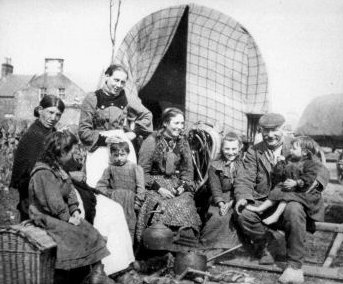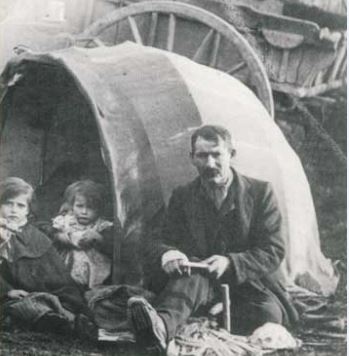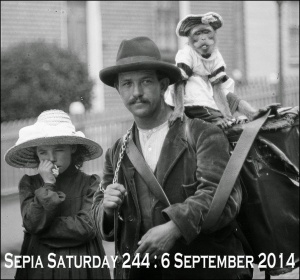This is a group of tinkers photographed in Fife early in the 20th Century.
The dictionary tells us that a tinker is
1. A travelling mender of metal household utensils
2. Chiefly British A member of any of various traditionally itinerant groups of people living especially in Scotland and Ireland; a traveller
And as itinerant is the key word for this week’s Sepia Sautrday the definition of tinker allows me to segue into a letter written by William Pender to his son Glaud in Australia in 1855.
We met Glaud Pender when he was proposing a toast to the Duke of Edinburgh But Glaud had been in Australia since 1852. Many years ago a distant cousin allowed me to transcribe this letter from Glaud’s father which at times is difficult to follow as you will see.
William Pender lived at Knowes Farm near Fauldhouse in Linlithgow (West Lothian) which is south of the road from Edinburgh to Glascow. The letter begins with a description of an accident involving a tinker suffered by Glaud’s younger brother, Andrew.
__________________________________________________________________Knowes Janry 12th 1855
Dear Glaud,
I Embrace the opertunity of sending A letter with Euphimia Brown in hope of you Receiving it This is the 6 I have sent I am Sorry to inform you Andrew has met with an accident
but I am Glad to Say that he is geting better He went away to go to Airdrie on the 6th of Janry and the mare shyed at A tynkers tent west from leadloch Cntry wheeled round and upset the Cart right on his throat The tinkers had Come and taking him from under it laid him down for dead ran off and left all They met 2 Engineers and told them there was A man lying on the roadside nearby kiled to run and give the Alarm They ran East to the den and A great many Came west but he was so disfigured they Could not know him til Wm Greenhorn came up with his Carts put him in one of his Carts and brought him home He lay About an hour in it Cold wet morning before any person Came to his Asistance the mare lying all the while under the Cart He has A Cut in one of his Cheeks 1 of his teeth brock and 2 loosed but had the tinkers not Come direct to his Asistance he could not have lived 10 minutes.
*** Note : Leadloch and Airdrie are to the west of Fauldhouse. Andrew was sixteen years old and apparently still living at home. Not all tinkers had the covered wagons to live in. For some their tent was separate to their cart and this may have been the case in Andrew’s accident. The cart referred to in the letter was Andrew’s cart which fell on him as his horse shied.
The letter then goes on to talk of Glaud’s other brothers and some local people.
David was here and went Away the day before Andw got hirt he has been working at Muselburgh this 4 months. Robt has got married on Jane Forrest he has got A daughter. Yur cousin Wm Storry (of) Northfield died of fever in Septr last. Sir W Bailee is dead . John Bishops Son (at) halfway house dropt down dead at his breakfast on Wednesday the 10th Janry Mr Griffin is very poorly he is not keeping the School John Thomson has left him he is keeping A School at Lesmahagow he is geting A good School and Mr Griffin has A young man from Harthill keeping the school for him
*** Note: David and Robert as well as Andrew are also younger brothers of Glaud. David also migrated to Australia later on. The letter mentions Sir W. Baillie and John Bishop. John Bishop was farm overseer to the Baillie family on their nearby Polkemmet estate It is of interest to the Pender family as John Bishop’s daughter Helen was married to Glaud’s cousin James Pender, and Helen’s mother was Elizabeth Burns, the eldest and illegitmate child of the poet Robert Burns. Burns called Elizabeth his “dear bocht Bess “
“Lord grant that thou may ay inherit
Thy mither’s looks an’ gracefu’ merit;
An’ thy poor, worthless daddy’s spirit,
Without his failins, “
William continues –
Trade has been very good this some time here and wages pretty high T he farm has paid well this 2 years but I had the misfortune to lose A good horse last year of lockjaw I have not seen any of your friends in Whitburn this 2 weeks but they are all in good health Robert Bayton has been out of work this some time but he is back to Mrs Smith Again Whitburn is A sturing place now there is a great deal of work going on About Capers they have got A Railway in to it from Bathgate They have got an Exelint cheam of Ironston East from Whitburn on Sir Wm’s land at Burnbrae and also plenty of good Coal. James McCulloch is very poorly he has not wrought any this 10 months Your mothers neck is A great deal more Swoln Since you left Scotland We ar all very Anxious to hear from you I think there has been 6 or 7 letters Sent away Since July last Dr Mitchell is often Enquiring about you
I Supose you will hear as much about the war in the East as we do here T hey ar in A bad State It is reported here that word has Come to Edinburgh on the 11 that Nicoles had given in . If you have the good fortune to Receive this be Sure and write Soon after I am still in the hope of Seeing you in Scotland yet I had a letter from Jas lately. They ar all well our friends are all in health as far as I know. Hoping this will find you all Enjoying the Same blessing. Give our kind love to Grace and Mary Ann
I Remain Dear Glaud
Your Affectionate father
Wm Pender
*** Note : Crimean War. This is about 6 weeks after the famous Charge of the Light Brigade at Balaclava. He is possibly refering to Nicholas I, emperor of Russia . Grace is Glaud’s wife and Mary Ann his daughter. Glaud’s father was to live for another 22 years but he never saw his son again.
William’s writing may lack punctuation and he has a creative way of placing capital letters, In this transcript I have added a few more capitals for some of the place names. He certainly manages to touch on a wide range of topics – – Andrew’s accident, family and local news, economic and international news. I doubt that I could do as well today even using a laptop in place of a steel nib pen and a container of ink. Thank you gggg grandpa William.
Further connections with the word itinerant can be found on Sepia Saturday




I love the way letter-writers sent along the news; terse comments, one after the other, about local/family happenings. Great letter!
LikeLike
A thoroughly entertaining post but how sad to read about Andrew and his horse. I’m glad Euphimia Brown delivered it to its intended recipient. I love that name by the way.
I don’t know if you remember visiting my blog a while ago and asking about the ‘going away’ suit my mum wore after her wedding? I’ve not been able to find a photo, but I am working on a post that might give a few clues. It’s not finished yet but should be on the blog in a week or so. Barbara.
LikeLike
Look forward to seeing what you have discovered.
LikeLike
What a marvellous letter that is! Sad for both the intended recipients and their descendants to think of all the uncollected letters that were never received and ended up in uncalimed mail lists in the gazettes.
LikeLike
Unclaimed I meant of course 🙂
LikeLike
I didn’t see it. The eye only sees what it expects to see.
LikeLike
After reading this, I believe I could speak with a Scottish accent…
Reminds me of the correspondence my mom kept with her mom,
all of that info crammed into a few pages.
🙂
LikeLike
That is a fascinating letter.
LikeLike
What a great letter though at one stage there I started to get a bit concerned about all the people that were dying or who were poorly. I think Glaud is an unusual name or am I just plain ignorant? Is it short for something or is it just Glaud? Does anyone else use the name today?
LikeLike
Glaud, or Glaude or Claud or Claude are all Pender family names. I am a descendant of this particular Glaud.
LikeLike
William sounds like an intelligent and fascinating man, an ancestor to be proud of.
LikeLike
A thoroughly absorbing post and a fascinating letter. All the background details made it so interesting.
LikeLike
Pingback: Glaud Pender and the Naming of the Engines | Bound for Australia